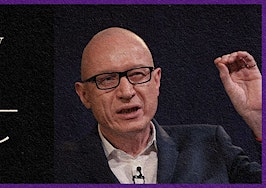The verdict is in — the old way of doing business is over. Join us at Inman Connect New York Jan. 23-25, when together we’ll conquer today’s market challenges and prepare for tomorrow’s opportunities. Defy the market and bet big on your future.
Before he moved to the U.S. and before he became CEO of Realtor.com parent Move Inc., Damian Eales lived in Australia — where he repeatedly bought and sold property.
“It can be a very terrifying experience,” Eales said. “I’ve bought property in Australia many times and there’s been nobody representing me in that transaction.”
Eales, who took the reins at Move earlier this year, made the comments during a Wednesday session of Inman Connect. Midway through the session, moderator Brad Inman asked Eales about the various antitrust lawsuits — one of which, Sitzer | Burnett, just wrapped at trial Tuesday — that challenge the way buyers’ agents get paid. Eales replied that “what comes with these antitrust cases has been a questioning of the value of buyers’ agents.”
“And I would say that even some in the industry have devalued the role of the buyers’ agent,” he added.
Eales argued in favor of buyers’ agents’ value, noting that he has first-hand experience in a market where they mostly don’t exist.
“In Australia, we don’t really have buyers’ agents,” he said. “Certainly not in mainstream residential property. It may occur right at the top of the market, but in the general residential market you only have the listing agent.”

Move Inc. CEO Damian Eales at a Wednesday session of Inman Connect. Credit: Inman
Eales went on to describe the challenges of buying in such an environment, noting that there was no one to push back and suggest a home might not be a good fit because, for example, it was located in a fire zone or a flight path. As a result, Eales indicated a preference for the current American system, where both sides have representation.
“Yes these antitrust cases and the [U.S. Department of Justice] case will definitely, perhaps, change how real estate is bought and sold,” Eales said. “But we as a society should truly value the professionalism and the value that buyers’ agents bring to consumers in this marketplace.”
At another point, Eales added of the American system, “Long may that continue.”
Eventually, Inman asked Eales if he thought the U.S. would eventually come to look like Australia, with its lack of buyers’ agents. Eales responded that he thinks change is coming, but that things may not go that far.
“I think that that’s such a change in how real estate is bought and sold, I don’t think it’s going to play out to that extent,” he said. “Obviously some changes will be made.”
In the Sitzer | Burnett case, a jury ultimately sided with a group of homeseller-plaintiffs who accused the National Association of Realtors and various major franchisors of a conspiracy. The conspiracy, according to the plaintiffs, was aimed at keeping commissions high.
Though the full implications of the verdict are yet to be seen, the case’s outcome sent shockwaves through the real estate industry, with many predicting significant commission compression in the future. A report last month also argued that NAR could ultimately lose 1 million members if shared commissions — a key point in multiple antitrust cases — are ultimately banned.
Later in the session, Eales also weighed in on the so-called portal wars. That conflict involves CoStar, traditionally a commercial real estate giant, trying to build a residential portal that challenges incumbents such as Zillow and Realtor.com. Eales acknowledged that there was more competition in the home search marketplace these days, but said he welcomes it.
“It’s good for consumers, it’s good for our customers, and quite frankly, it’s good for us as well,” Eales said of more competition. “It makes us better and sharper.”
Eales later said Realtor.com has a “very high-value audience” and that the company’s strategy is to further build that audience up. That specifically includes providing quality leads to agents representing both buyers and sellers. And Eales added that Realtor.com’s customers “can see through some of the claims” of rival companies.
“Fundamentally, our business is growing a quality audience,” Eales said, adding a moment later, “We’ve only just begun.”













